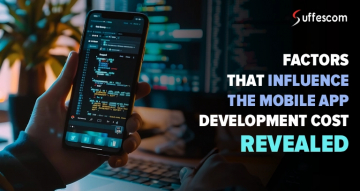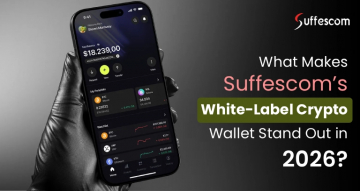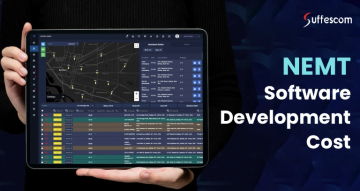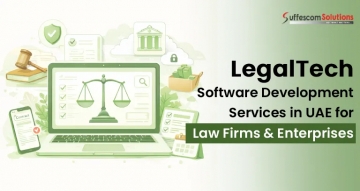Blockchain in Mobile Apps: Trends, Benefits, and Development Guide

The blockchain market is projected to surpass $3 trillion by 2026, transforming industries with its secure, decentralized technology. Blockchain mobile app development is at the forefront of this revolution, offering unmatched security, transparency, and efficiency for businesses in healthcare, finance, real estate, and beyond. In this guide, we explore the role of blockchain in mobile apps, its benefits, top trends for 2025, and actionable steps to build your own blockchain-powered app. Whether you're a startup or an enterprise, discover how to leverage this technology and choose the right blockchain developer to bring your vision to life.
What is Blockchain in Mobile App Development?
Blockchain is a decentralized ledger technology that records transactions across a network of computers, ensuring security and transparency without a central authority. In mobile app development, blockchain enables secure data management, transparent transactions, and tamper-proof systems, making it ideal for apps in finance, healthcare, and supply chain.
For example, a healthcare app can use blockchain to securely store patient records, while a finance app can facilitate peer-to-peer (P2P) transactions with minimal fees. By eliminating intermediaries, blockchain reduces costs and enhances trust, setting a new standard for decentralized applications (DApps).
Why Blockchain is a Game-Changer for Mobile Apps
Blockchain’s unique features make it a powerful tool for mobile app development. Here’s why developers and businesses are adopting this technology:
Enhanced Security and Encryption
Blockchain’s cryptographic hashing ensures that data is stored in interconnected blocks, making it nearly impossible for hackers to alter information. Each block contains transaction data linked to the next, creating a tamper-proof chain. This high-level encryption protects sensitive data, such as financial transactions or medical records, making mobile apps safer for users.
High Transparency and Trust
Every transaction on a blockchain is recorded in a public ledger, accessible to all stakeholders. This transparency eliminates fraudulent activities, as no transaction can occur without consensus. For instance, a real estate app using blockchain can provide verifiable property transaction histories, building trust with users.
Cost Efficiency and ROI
Blockchain reduces operational costs by automating processes and eliminating intermediaries. Studies estimate that banks can save $8–12 billion annually by adopting blockchain for transaction processing. For businesses, decentralized apps offer a strong return on investment (ROI) compared to traditional development methods, as they require less infrastructure.
Integration with IoT
Blockchain seamlessly integrates with the Internet of Things (IoT), enabling secure control of smart devices. For example, a mobile app can use blockchain to manage IoT-enabled home security systems, ensuring data integrity and preventing unauthorized access. This synergy enhances user experiences and opens new revenue streams for businesses.
Top Blockchain Trends for Mobile Apps in 2025
As blockchain evolves, new trends are shaping mobile app development in 2025. Here are the latest developments:
AI-Blockchain Integration: Combining AI with blockchain enables predictive analytics for transaction validation, enhancing app performance. For example, AI can detect fraud in real-time within blockchain-based finance apps.
Web3 Mobile Apps: Web3 apps, built on blockchain, are gaining traction for decentralized experiences like NFT marketplaces and DeFi platforms, offering users greater control over their data.
Stablecoins and CBDCs: Central bank digital currencies (CBDCs) and stablecoins are streamlining mobile payments, especially for small to medium enterprises (SMEs), by reducing settlement times and costs.
Cross-Platform Development: Frameworks like React Native and Flutter are making it easier to build blockchain apps for both iOS and Android, reducing development costs.
Leading Enterprise Blockchain Consultants in USA
Initiate your blockchain business consultation with our experts at Suffescom Solutions Inc. As a leading enterprise blockchain consultant in USA, our blockchain team leverages its expertise to craft enterprise blockchain solutions that are highly reliable and secure.
Features of Blockchain Mobile App Development
Better Security:
One of the key advantages of blockchain mobile app development is the high level of security provided by the fact that all information is spread across interconnected blocks. Each block contains all transaction-related information, which is then passed on to the following block.
All of the data is encoded and kept in the cryptographic hash, making it extremely difficult for hackers to change the blocks. Mobile applications are now safer and more secure thanks to high-level encryption and cryptography. As a result, developers and consumers need not be concerned about security and encryption.
Reliability:
Blockchain offers a high level of transparency by providing a tamper-proof solution. Even if tampering occurs in one site, it has no effect on the reliability and security of data stored in other locations.
All of these qualities make blockchain technology suited for a wide range of mobile apps, whether for financial transactions, document storage, or any other data. This technology has the potential to greatly boost data storage apps.
High Transparency:
Transparency is the primary reason that consumers of decentralized applications trust blockchain. Every transaction is recorded in the ledger, allowing anyone to track them. This eliminates the chance of any fraudulent activity.
Return on investment (ROI):
Despite the fact that decentralized apps (Dapps) are new, industries are discovering innovative methods to incorporate them into their systems. The ROI remains good, and integrating blockchain will not cost you a lot of money when compared to alternative development approaches.
As a result, when compared to traditional apps, blockchain appears to be the ideal answer for organizations in terms of ROI.
Integration with IoT:
As you know, mobile apps are the best illustration of how they combine with IoT. (Internet of Things). You may now operate your Smart goods, such as security systems, interior heating, and lighting, with the touch of a button.
Consider incorporating blockchain elements into your home or business equipment that is controlled by Dapps to safeguard information and assist businesses in providing authentic products to clients, saving money and avoidable difficulties for businesses and customers.
You can reach out to an experienced Enterprise blockchain consulting firm that can guide you to get started with your journey in blockchain mobile app development.
How Do Blockchain Trends Effects Small to Medium-sized Enterprises?
As we all know, the pandemic has had a significant impact on SMBs. According to a report, digital ledger technology can provide long-term answers to a variety of SMB concerns. It will make greater use of the data collected in the SMB ecosystem. Blockchain enables such companies to make quick international payments by utilizing central bank digital currencies and stable coins to cut settlement periods.
- Improve data transparency and reduce the risk for banks, lowering the cost of insurance and financing for SMBs.
- Eliminate the error repair time for transactions so that SMBs can continue to do business without worrying about finance, liquidity, or losing supplier discounts.
- Rise the loan approval rates by incorporating high-quality informational data into credit decision-making processes.
How to Integrate Blockchain into Your Mobile App
After knowing the benefits of blockchain in mobile app development, here is the list of the steps for your blockchain-backed mobile application development.
Step 1- Apps That Are Best Fit For Blockchain
There are a variety of blockchain-based apps available on the market. Still, your app may not require blockchain, such as essential content-driven apps that do not require transaction functionality.
However, blockchain will be ideal if you are developing an app with features like payment gateways, transaction interfaces, or anything similar and require the active backing of a decentralized and secure database system.
Step 2- Considering Critical Technologies
Assume you wish to incorporate Blockchain Technology in your mobile app. In that case, your blockchain developers should be well-versed in the technology and its various components, such as programming languages, networks, blockchain platforms, and other procedures such as front-end, back-end, and QA for various mobile platforms.
Step 3- Implementing Blockchain
As discussed above, blockchain technology has various benefits in creating a mobile app that can help you take your business ahead. Here is how you can develop the blockchain-powered app.
Pick A Suitable Method
If you're familiar with blockchain technology, you're probably aware that a mutual consensus mechanism protects the blockchain's security and unconditional accessibility. Now, choose the best consensus method for your app's requirements advised by your blockchain development team members.
Architecture Design
Now you must select the best setup for your design model. You should now host blockchain using a hybrid, cloud-based, or in-house strategy. Fortunately, you have several options for this. You must ensure that the design architecture for the app is based on the mobile OS platform and tech stack your mobile development partner advises.
Admin Panel UI Plus
Finally, you should create your blockchain application's user interface and administration panel. This is simple to accomplish with defined app servers, a front-end programming language, and an external database.
Want To Redefine Your Blockchain Business Idea?
Give Us A Chance! Exchange Your Ideas With Our Experienced Blockchain Experts.
Top Blockchain Platforms For App Development
Tezos
Tezos is an autonomous decentralized blockchain technology that has matured into a true digital commonwealth. This platform is tied to the Tez or Tezzie digital coin. Rather than extracting Tez, the platform compensates token holders for participating in the proof-of-stake consensus technique.
Tezos, like Neo and other platforms, is a platform for dApps and smart contracts. One aspect, however, sets it apart from the others: its self-amending cryptographic process.
Tron
Tron is a blockchain-based decentralized digital platform that uses the TRX or Tronix coin. It intends to host a global entertainment system for the cost-effective distribution of digital material. In terms of market capitalization, it is ranked 31st among cryptocurrencies.
Tron combines the advantages of P2P networks and blockchain technology to cut out the middlemen and allow content creators to sell their work directly to customers.
Hyperledger Fabric
Another Hyperledger project, Hyperledger Fabric, aids in the development of blockchain-based solutions or apps through the use of a modular design. The versatility of the architecture allows network designers to plug in their preferred components.
The Hyperledger Fabric framework is designed for permissioned networks and allows known identities to engage within a system. To participate in the blockchain, they must be approved and have the necessary credit.
Hyperledger Sawtooth
Hyperledger Sawtooth is an enterprise-grade and modular platform designed for creating, implementing, and executing distributed ledgers that allow for the maintenance of digital records with no central authority.
Hyperledger's open-source blockchain infrastructure combines with an enterprise-ready 1.0 version.
Wrapping up!
Blockchain technology is always improving and will address mobile app difficulties so you can better serve your clients. Given all of the benefits, you should consider adopting blockchain in app development to better customer service. Blockchain can provide firms with digital transparency, consumer trust, and liability. Everyone, from freelance developers to sizeable mobile app development organizations, realizes blockchain's promise as a decentralized database. Blockchain-based apps will continue to grow in popularity as mobile transactions gain traction in the coming years. All you need to do is consult the leading Blockchain app development company & start your journey now!
FAQs
1. What is blockchain in mobile app development?
Blockchain is a decentralized ledger technology that enhances mobile apps with secure, transparent, and tamper-proof data management, ideal for transactions and sensitive data.
2. Why should I use blockchain for my mobile app?
Blockchain offers enhanced security, transparency, cost efficiency, and integration with IoT, making it ideal for apps in finance, healthcare, and more.
3. How much does it cost to develop a blockchain mobile app?
Costs vary based on complexity, platform, and developer expertise. Contact a blockchain app development company for a tailored quote.
4. What are the best blockchain platforms for mobile apps?
Popular platforms include Tezos, Tron, Hyperledger Fabric, and Sawtooth, each suited for specific use cases like smart contracts or permissioned networks.
5. How do I choose a blockchain app development company?
Look for expertise in blockchain platforms, mobile app frameworks, and proven case studies. Schedule a consultation to discuss your project needs.







